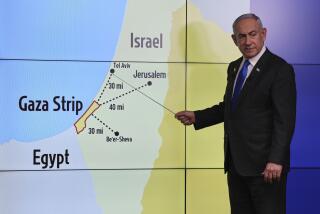Shamir Sees Bush, Tries to Revive Peace Process
- Share via
WASHINGTON — Israeli Prime Minister Yitzhak Shamir called Wednesday for an early meeting of U.S., Israeli and Egyptian foreign ministers to revive the stalled Mideast peace process after an apparently acrimonious White House meeting in which he and President Bush aired festering differences.
In separate statements, senior U.S. officials and Shamir said that the meeting helped to clarify the issues that have produced unusual friction between the close allies. Although both sides emphasized that the overall relationship is good, they made it clear that significant gaps remain over the details of plans to resolve the Arab-Israeli conflict.
Also, Bush complained to Shamir about Israel’s military cooperation with South Africa and about continuing Jewish settlements in the occupied West Bank and Gaza Strip. Although both issues have been discussed for years at lower diplomatic levels, they are seldom raised at such a high level.
White House Press Secretary Marlin Fitzwater appealed for patience in a way that seemed to indicate that the Administration is running out of it: “It’s important not to become impatient when you’re dealing with the Middle East. Two thousand years is the normal wait for things to happen.”
Talking to a small group of reporters, Shamir said that basic decisions on the peace process will not be made until Secretary of State James A. Baker III, Israeli Foreign Minister Moshe Arens and Egyptian Foreign Minister Esmat Abdel Meguid meet to discuss the matter.
“They will meet, I hope, very soon,” Shamir said.
The State Department has said that a meeting of the three foreign ministers is the final step in Baker’s five-point plan for U.S.-mediated negotiations between Israelis and Palestinians. But department officials said that the meeting should not be scheduled until all sides agree on the first four points, something that U.S. officials said Wednesday appears to be a long way off.
Shamir’s policy-making Inner Cabinet voted 9 to 3 to accept the Baker plan “in principle,” provided that the United States gives Israel assurances that it will not be asked to negotiate with Palestinians from outside the occupied territories or with anyone representing the Palestine Liberation Organization. The Israeli government also asked for guarantees that if the talks ever begin, they will be limited to the details of Israel’s proposal for Palestinian elections in the territories.
The Bush Administration did not offer the promises that Israel requested, officials on both sides said. Nor did Shamir yield on any of the points.
At the same time, both Shamir and U.S. officials emphasized that Egypt--which is serving as unofficial surrogate for the PLO--has not responded officially to Baker’s five points. A senior State Department official said that the talks cannot proceed until Egypt gives its official answer.
Responding to Bush’s criticism of Israel’s military cooperation with South Africa, Shamir said he told the President that his government decided two years ago to sever the relationship but intended to honor contracts “until they expire.” He denied that Israel has aided South Africa in developing a nuclear-capable ballistic missile.
Shamir also said that he made it clear to Bush that his government will not withdraw from any of the previously Arab-controlled territory it now occupies, even to obtain a peace agreement with the Arab world. The United States has long advocated such a territory-for-peace swap.
More to Read
Sign up for Essential California
The most important California stories and recommendations in your inbox every morning.
You may occasionally receive promotional content from the Los Angeles Times.













